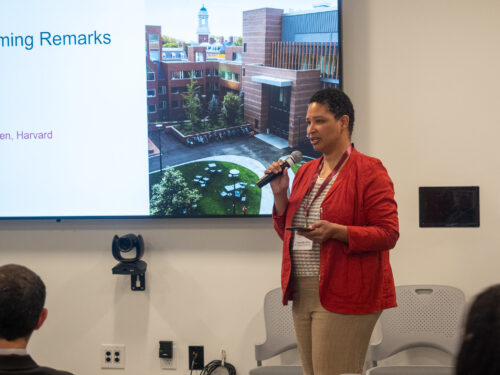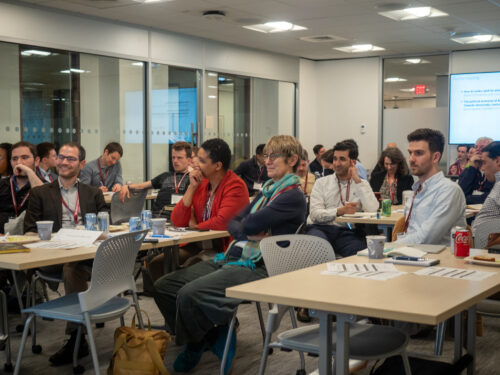
Lightning Talks: The AI Stack Examined–Data, Labor, and Energy
The day began with a series of lightning talks by Professor Yochai Benkler (Harvard Law School), Professor Sharon Block (Harvard Law School), and Noman Bashir (MIT).
Professor Benkler kicked off the session with an overview of the Law and Political Economy framework for political and legal analysis he has been instrumental in developing. He then highlighted how contemporary industry practices of data extraction privilege monopolistic actors and rely on and deepen asymmetric power imbalances between workers and managers.
Following Benkler, Block zeroed in on the labor that goes into the production of large AI models. Block focused on work like data labeling often conducted abroad by contracting companies left largely unregulated and outside public scrutiny. She argued that contemporary digital systems profit off the myth that they are both “innovative” and “artificial,” while, in her account, they function because of real-world and age-old exploitative labor practices.
Lastly, Noman Bashir closed the lightning talk session with a discussion of the significant carbon emissions and water usage that go into training and using large AI models. Bashir underlined the difficulty of measuring the climate impacts of these systems and urged academics and regulators to begin measuring and mitigating those impacts.
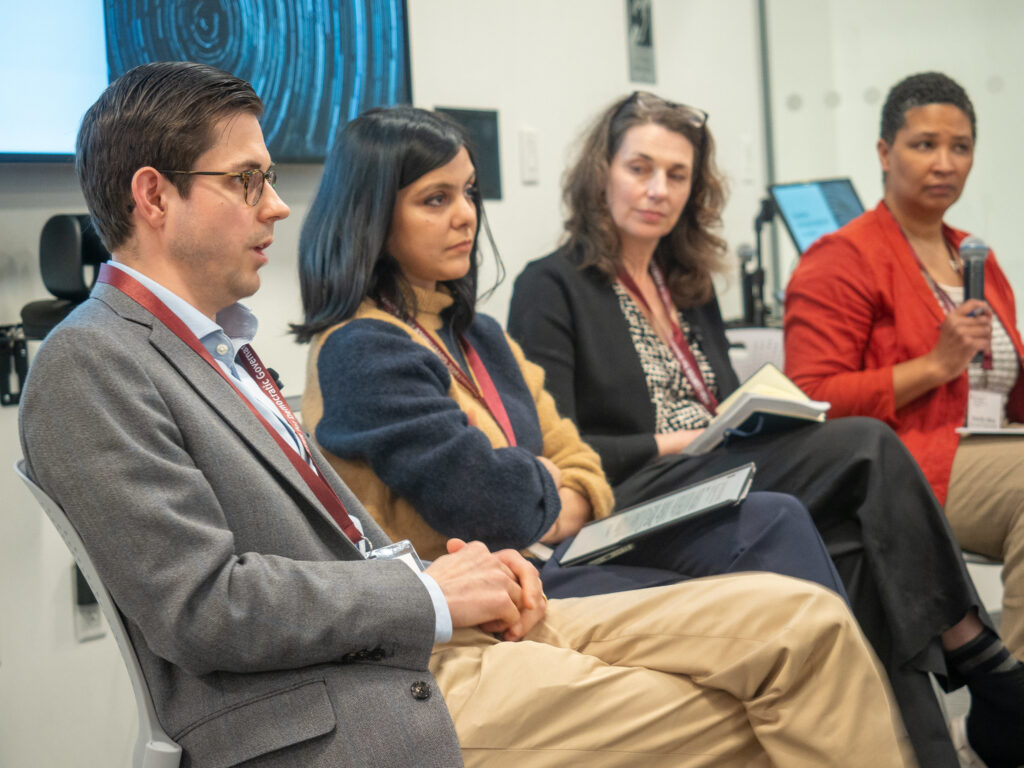
Panel: Unpacking Motivations Behind AI Innovation
The day’s first panel convened Amba Kak (AI Now), Janet Haven (Data & Society), and Julius Krein (American Affairs). Navigating productive disagreement between Krein, Kak, and Haven, the hour-long discussion touched on issues of industrial policy, anti-monopoly approaches to governing big tech, and challenges to building a popular and regulatory movement to counter the consolidation of power in Silicon Valley firms.
Fireside Chat: Democratic Control of the Means of Production
Taylor Jo Isenberg led a conversation with Maximilian Kasy (Oxford) on his new project, tentatively titled The Political Economy of AI: Towards Democratic Control of the Means of Prediction. Kasy’s presentation briefly outlined the deficiencies in traditional economistic approaches to the regulation of prediction systems and then turned towards a sketch of the necessity of democratic control of the rudiments of digital prediction – ie: data, energy, and labor. Kasy then answered questions from the audience.
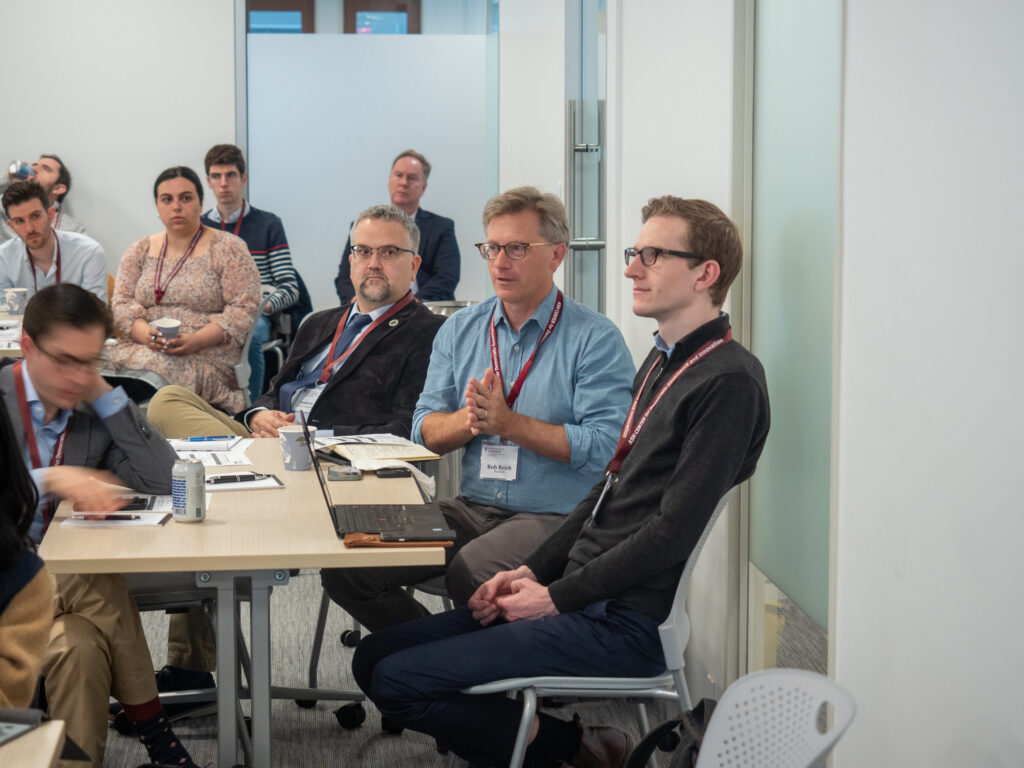
Panel: Alternative Models of Technological Innovation in History
Marc Aidinoff (IAS), Andy Russell (SUNY), and Susannah Glickman (Stony Brook) shared the stage for a panel on alternative histories of innovation, highlighting the central point that the contemporary high-capital investor-backed model is neither necessary nor eternal. Russell highlighted the issue of consolidation and concentration, identifying the novelty of the contemporary technology industry’s reliance on massive starting capital often secured through venture capital funding. Aidinoff identified the complexities of inter-bureaucratic politics in developing technology policy, and Glickman pushed the panel to consider the role of the state in tacitly or quietly establishing priorities for technological innovation. All students of the history of computing technologies and technology policy, the panel moved swiftly between historical analysis and contemporary critical thought.

Panel: AI in the Public Interest–Federal and State Perspectives
Contemporary discussions of technology regulation often remain high-level, debating national or international policy instruments. This panel critically examined the role of state governments in the issue, inviting Secretary and Massachusetts CTO Jason Snyder, Secretary of Economic Development Yvonne Hao, and former Chief of Staff in the White House OSTP Ami Fields-Meyer. Moderated by Alex Pascal, the conversation offered a ground-level understanding of the ways some state and local governments like Massachusetts might be implementing novel digital technologies and AI-augmented tools in day-to-day government services. Secretaries Hao and Snyder, in particular, saw potential opportunities for local governments to improve services through the cautious use of AI-augmented tools. Fields-Meyer offered a federal perspective, cautioning against the possible misuse or unintended consequences of government use of these tools.
Panel: Building a Political Economy of AI for our Shared Future–Imagining Alternatives
On this final panel of the day, Glen Weyl (Microsoft), Nathan Sanders (Harvard BKC), and Rebecca Henderson (Harvard Business School) came together for a conversation moderated by Allison Stanger (Middlebury). They touched on a wide range of issues, with Henderson calling for a more human approach to technology. Henderson advocated for a broader rediscovery of the joys of non-digital interaction with others and with nature. Sanders discussed his work on public AI options, work he has developed with Bruce Schneier in a number of essays. Lastly, Glen Weyl discussed his recent book with Audrey Tang in which he discussed the “plurality” digital movement in Taiwan, advancing a vision for pro-social technological development supportive of democratic deliberation.
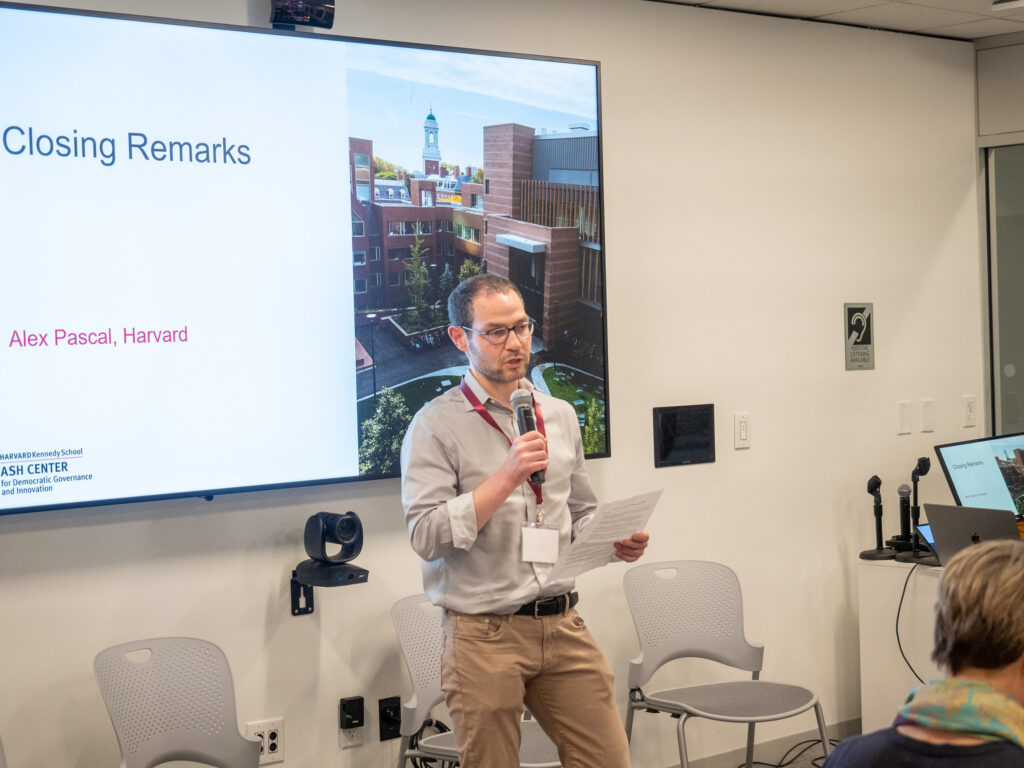
Ultimately, the event aimed to develop a research agenda bringing critical approaches to political economy to questions about power, technology, and democracy. To learn more about our future projects and collaborations, visit the Allen Lab for Democracy Renovation or GETTING-Plurality pages.


